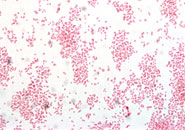A recent spike in whooping cough cases is prompting health officials to remind parents to get their infants immunized on schedule. Officials also urge parents, grandparents and caregivers as well as older children to get booster vaccine to prevent the disease.
According to CDC data, there were 449 whooping cough cases in Kentucky this year through November 26 compared to 163 cases for all of 2015. Since August 7 there have been six laboratory confirmed whooping cough cases and four additional possible cases in Louisville. Most of those cases were linked to adults who were unsure of their vaccination status.
According to Dr. Joann Schulte, director of the Louisville Metro Department of Public Health and Wellness, adults may have pertussis but not realize it because it can initially seem like a common cold. “If a person has a cough that last for more than two weeks, they need to see their healthcare provider and request to be tested for pertussis,” she said.

Photo: CDC
“Whooping cough can be deadly for babies younger than six months old,” said Schulte added. “It is also vitally important for infants to get their immunizations against whooping cough at the appropriate stages in their growth and development.”
Whooping cough – known medically as pertussis — is a highly contagious respiratory tract infection. It spreads easily and can cause violent coughing fits that can last up to 10 weeks or more. Although it initially resembles an ordinary cold, whooping cough may eventually turn more serious, particularly in infants. In some infants, the cough may be minimal or not even there. Infants may also display apnea, a pause in the child’s breathing pattern and in some cases may even turn blue. About half of infants younger than one year who get the disease need care in the hospital.
“The best way to prevent whooping cough is through vaccinations,” Schulte said. The childhood vaccine is called DTaP. Adolescents and adults need a whooping cough booster vaccine called Tdap, as well. Both protect against whooping cough, tetanus, and diphtheria.
“Even if parents and care givers have been immunized against whooping cough or had the illness as children, they should get the booster,” said Dr. Schulte. “Vaccines can wear off over time. Parents, siblings and care givers can then infect infants and young children. Unfortunately babies younger than six months are too young to have completed their three pertussis immunizations and are not yet well protected by the pertussis vaccine. They can become infected by others living in the home or by caregivers.”
The Department of Public Health and Wellness follows CDC guidelines advising parents and physicians that infants should receive a series of DTaP immunizations at ages 2, 4, and 6 months, with boosters at ages 15-18 months and at 4-6 years. Children should then get a single dose of TdaP vaccine beginning at age 11. It is also recommended that family members of infants receive a one-time dose of adolescent/adult Tdap vaccine if they have not already done so.
Parents of infants and all people who live with an infant or who provide care to him or her should also be immunized against whooping cough. It is recommended that the infant’s family members receive a one-time dose of adolescent/adult tetanus-diphtheria-acellular (Tdap) vaccine if they have not already done so.
“Parents should contact their primary care providers for questions about any childhood or adult vaccine,” Schulte said. We are also happy to answer any questions. Call us at 574-6675.
 Weather
Weather Traffic
Traffic @LouisvilleDispatch
@LouisvilleDispatch @LouisvilleDisp
@LouisvilleDisp Subscribe
Subscribe
Leave a Reply